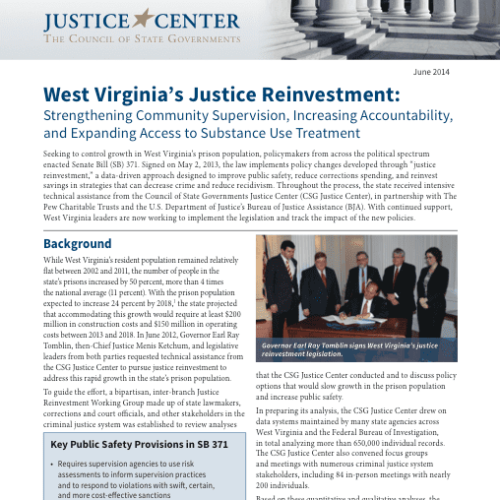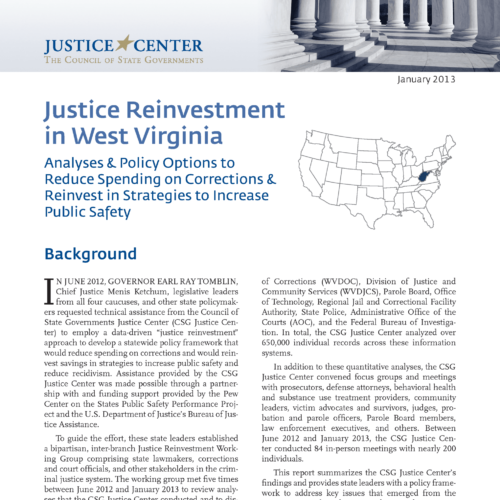West Virginia Expands Access to Substance Use Treatment through Justice Reinvestment
In 2012, West Virginia’s governor and legislative leaders faced some dire challenges. The state had the highest drug overdose death rate in the country, funding for treatment in the community was scarce, everyone from prosecutors to judges was clamoring for more treatment for people with substance use issues who were going through the courts, and supervision failures often stemming from substance use were fueling growth in the prison population, which was rising faster than nearly every other state in the nation. If no action was taken, state leaders would be forced to spend as much as $350 million over the next 5 years to build more prisons.
In response to these urgent problems, leaders from both parties and all three branches of state government joined together, reviewed data-driven analyses conducted by The Council of State Governments (CSG) Justice Center, and agreed to adopt justice reinvestment legislation that became law in 2013. The resulting policies and implementation efforts that followed have helped West Virginia curb the growth of the prison population and invest in expanding substance use treatment.
- Since enacting justice reinvestment in 2013, spending on treatment for people under criminal justice supervision went from close to zero to $3 million annually. These new resources are helping to fund inpatient and outpatient treatment programs, the hiring of recovery support specialists, and the development of residential recovery facilities.
- State agencies are ensuring that the new resources for treatment are leveraging Medicaid and other health insurance coverage for behavioral health services. West Virginia is identifying state-funded programs, such as treatment services provided within the state’s network of Day Report Centers, that could be covered by Medicaid.
- The justice reinvestment legislation provided more alternatives to incarceration for judges and prosecutors to use for people who have substance use treatment needs. Drug courts will be expanded statewide by July 1, 2016, and there is now a new sentencing option called “treatment supervision,” which ensures people on community-based supervision receive substance use treatment and services.
- In 2012, probation and parole revocations were driving an increase in the prison population, which was expected to grow by 10 percent by 2014. Because of West Virginia’s justice reinvestment policies and implementation, however, probation and parole revocations declined between 2012 and 2014, and the prison population remained stable.
Governor Tomblin has praised the justice reinvestment legislation. “Through this research-driven approach, we have developed a financially sustainable plan to reduce prison overcrowding and rehabilitate inmates so they can successfully reintegrate into their communities, families, and workplaces,” he said.
To learn more about the justice reinvestment approach that policymakers in West Virginia used, consult these reports from The CSG Justice Center.
This project was supported by Grant No. 2013-ZB-BX-K002 awarded by the Bureau of Justice Assistance. The Bureau of Justice Assistance is a component of the Department of Justice’s Office of Justice Programs, which also includes the Bureau of Justice Statistics, the National Institute of Justice, the Office of Juvenile Justice and Delinquency Prevention, the Office for Victims of Crime, and the SMART Office. Points of view or opinions in this document are those of the author and do not necessarily represent the official position or policies of the U.S. Department of Justice.
Arkansas policymakers have long expressed concerns about the state’s high recidivism rate. Over the past 10 years, an…
Read MoreIn April 2025, Arkansas Governor Sarah Huckabee Sanders signed a package of bipartisan criminal justice legislation into law,…
Read More Explainer: Key Findings and Options from Arkansas’s Justice Reinvestment Initiative
Explainer: Key Findings and Options from Arkansas’s Justice Reinvestment Initiative
Arkansas policymakers have long expressed concerns about the state’s high recidivism rate.…
Read More Explainer: How a New Law in Arkansas Tackles Crime, Recidivism, and Community Supervision Challenges
Explainer: How a New Law in Arkansas Tackles Crime, Recidivism, and Community Supervision Challenges
In April 2025, Arkansas Governor Sarah Huckabee Sanders signed a package of…
Read More











